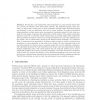Free Online Productivity Tools
i2Speak
i2Symbol
i2OCR
iTex2Img
iWeb2Print
iWeb2Shot
i2Type
iPdf2Split
iPdf2Merge
i2Bopomofo
i2Arabic
i2Style
i2Image
i2PDF
iLatex2Rtf
Sci2ools
124
click to vote
IPSN
2004
Springer
2004
Springer
Distributed online localization in sensor networks using a moving target
We describe a novel method for node localization in a sensor network where there are a fraction of reference nodes with known locations. For application-specific sensor networks, we argue that it makes sense to treat localization through online distributed learning and integrate it with an application task such as target tracking. We propose distributed online algorithm in which sensor nodes use geometric constraints induced by both radio connectivity and sensing to decrease the uncertainty of their position. The sensing constraints, which are caused by a commonly sensed moving target, are usually tighter than connectivity based constraints and lead to a decrease in average localization error over time. Different sensing models, such as radial binary detection and distance-bound estimation, are considered. First, we demonstrate our approach by studying a simple scenario in which a moving beacon broadcasts its own coordinates to the nodes in its vicinity. We then generalize this to th...
Related Content
| Added | 02 Jul 2010 |
| Updated | 02 Jul 2010 |
| Type | Conference |
| Year | 2004 |
| Where | IPSN |
| Authors | Aram Galstyan, Bhaskar Krishnamachari, Kristina Lerman, Sundeep Pattem |
Comments (0)

